Pest Control Cost
Last updated 31st March, 2025
How much does pest control cost?
Pest control prices can vary depending on the type of pest in your home and how bad the infestation is.
While you may be able to get rid of some pests yourself, hiring a professional pest controller can ensure the job is completed properly and reduce the risk of further damage to your home.
On average, you can expect to pay between £50 and £215 for home pest control services in the UK. The sooner an infestation is tackled, the cheaper it might end up being.
Dealing with any household pest problem can be stressful, but this guide will help you identify the risks to your home and how much it could cost to address the issue.
Check it out below!
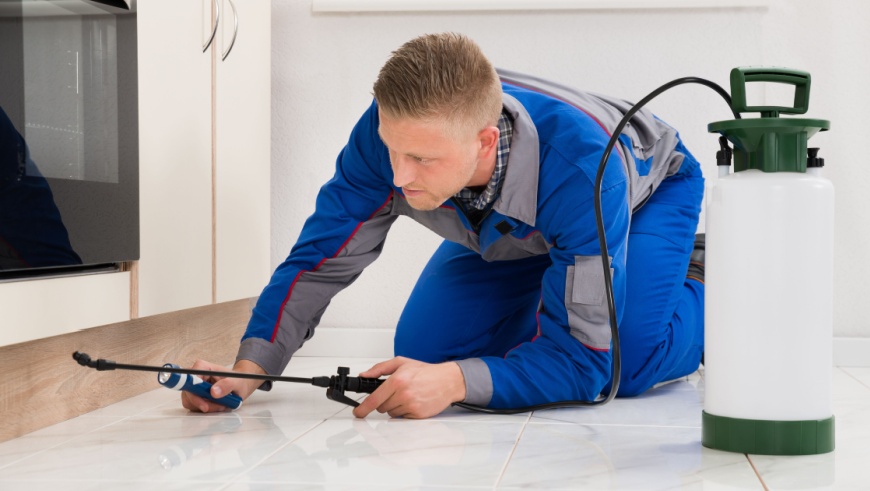
How Much Is Pest Control?
The rates charged by private pest control companies vary considerably.
The actual price of pest control services will depend:
- Where you are in the UK.
- The kind of pests you need to get rid of.
- Scale of the infestation.
- Size of the property.
- Type of pest control company you hire.
Okay, but can you give me some typical prices to consider?
The average pest control specialist will usually charge around £150 to £200 per day. Typically, controlling pests should not take a full day unless there is a major infestation.
To give some examples of prices, to treat a single wasp nest will cost around £55, and to treat carpets and furniture for fleas will cost from £80 to £150 depending on the size of the property.
For bedbugs, expect to pay £135 to £215 while ant control treatments cost around £60. Cockroach treatment for a two or three-bed house will cost around £50, rodent control around £100, and mole or squirrel treatment around £80.
Bear in mind that pest control costs aren't always a one-off. If a pest infestation is particularly bad then it may take several visits over a period of months to fully eradicate the problem.
Can I get cheaper pest control?
Some pest infestation treatments and equipment such as mousetraps are available over the counter in hardware stores. However, these may be ineffective on serious infestations and it can be more humane to hire a specialist registered with the National Pest Technicians Association (NPTA) or the British Pest Control Association (BPCA).
One of the best ways to lower your pest control costs is to tackle an infestation as soon as you become aware of it.
Table of Contents
- How much is pest control?
- What is the cost of DIY pest control?
- Additional pest control costs
- What is the cost of pest control labour?
- What is pest control?
- What factors impact pest control costs?
- What does pest control involve?
- DIY pest control
- Types of pest control
- Pest control survey cost
- FAQs
- How to find & hire a pest control contractor
- Sources
Pest Control Prices
| Type | Avg. Cost |
|---|---|
| Mice & Rats | £75 – £125 |
| Bed Bugs | £135 – £215 |
| Cockroaches | £50 – £100 |
| Fleas | £80 – £150 |
| Wasps | £50 – £75 |
| Flies | £50 – £75 |
| Ants | £50 – £100 |
What Is the Cost of DIY Pest Control?
The actual cost of pesticides, insecticides and other pest control treatments vary greatly depending on its use, availability and strength.
There are many treatments that you can buy in a hardware store that cost around £5 to £10, but they may not solve your problem. These treatments are made to be much weaker than those at the disposal of a pest control professional because companies worry about the liability of any incidents caused by their products. After all, most of them are toxic to humans and other animals.
Here is a helpful table that shows the cost of different treatments you can purchase yourself:
| Type of Treatment | Used for | Price |
|---|---|---|
| Aerosol Sprays | Ants, Wasps & Flies | £3 – £6 |
| Chemical Spray | Ants and Bugs | £4 – £10 |
| Traps | Rodents | £5 – £20 |
| Pellets and Poisons | All Pests | £5 – £15 |
Additional Pest Control Costs
While pests can cause annoyance and health fears, there are also other potential risks to your property that may come with hefty price tags.
These issues can depend on the type of pest in your home and how entrenched the infestation is. However, if any of the following have occurred, there may be extra expenses to factor into the overall cost of pest control:
- Electrical or fire hazards from damage to wires.
- Water or moisture ingress from damaged pipework.
- Damage to the structure of the building.
Problems will vary in seriousness depending on the scale of the infestation, which is one reason why addressing pest issues before they take root can be a money-saver in the long run.
As an example, replacing or refreshing insulation following an infestation of rodents could require checking loft insulation prices or attempting a DIY job.
Similarly, fixing electrical problems caused by rodents can be costly, especially if a full rewire is required. As the cost to rewire a house can start from £1,500 depending on the size of your home, avoiding such a drastic option is preferable.
Pest Control Cost Breakdown Calculator
Individual costs of Rodent Control - Total Cost: £100
Materials
£30
Tradesmen
£70
Waste Removal
£0
What Is the Cost of Pest Control Labour?
Labour costs are usually included in pest control price quotes, and how long a job takes depends on what type of pest you have.
An hourly rate of between £20 to £25 per hour should be expected for handling a pest infestation. This loosely works out at £160 to £200 per day.
While fly, ant, cockroach and wasp infestations may only take a couple of hours to complete, the exterminator cost for other common pests such as fleas and bed bugs can be higher because these pest infestations are more difficult to treat.
The scale of an infestation can also affect the cost of pest control. This is why tackling any type of pest problem early on can save you money, both by limiting the overall damage and reducing the amount of time an exterminator needs to spend at your home.
Remember, too, that exterminator costs will vary depending on where you are in the country and whether the pest controller offers hourly rates or works on a half-day or day rate basis.
| Type | Duration |
|---|---|
| Mice & Rats | 2 – 3 Hours |
| Bed Bugs | 4 – 8 Hours |
| Cockroaches | 1 – 2 Hours |
| Fleas | 3 – 4 Hours |
| Wasps | 1 – 2 Hours |
| Flies | 1 Hour |
| Ants | 1 – 2 Hours |
What Is Pest Control?
Pests find ways to get into your home, or the areas surrounding it, having an adverse impact on the comfort and structural integrity of your home. There are a whole host of different pests that can impact your home and in turn, a wide variety of treatments to expel them.
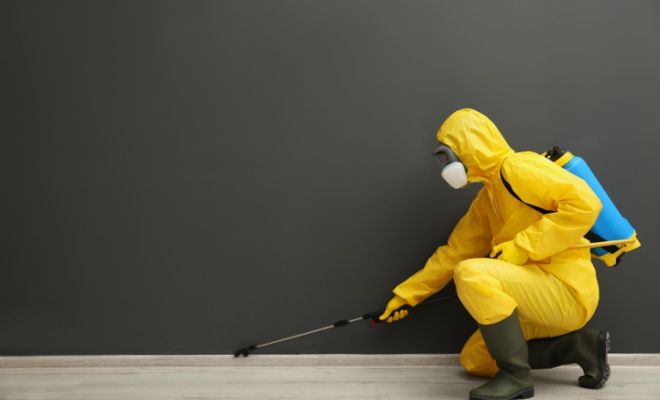
Getting rid of pests often requires the efforts of a trained pest control professional to safely and humanely rid your home of the infestation. However, there are a number of DIY measures that you can implement to tackle certain pests, although they may not be as effective as a registered exterminator.
What damage can pests do?
Rats and mice can cause damage to furniture and cables with their incessant gnawing, while at the same time posing a serious health risk.
Bedbugs feed on your blood while you sleep, cockroaches carry diseases and are disgusting, stinging insects like bees, wasps and hornets will, of course, sting you, ants will invade your house and get everywhere, while moles and squirrels will cause a great deal of damage to your home and garden.
As well as the potential health and environmental risks of a pest infestation, if you try to sell your home, the presence of pests could hamper the chances of a successful sale.
What Factors Impact Pest Control Costs?
As is common with most contracting work, the price will differ depending on a variety of factors, mainly the location, severity or accessibility of your problem.
Firstly, as a general rule, prices are higher in big cities like London and Manchester and tend to be higher in southern England. The price also varies depending on the extent of the problem, so if you’ve caught your mouse problem early, the price will be a lot lower than if you have many litters living in various spots around the home.

The type of pest dictates the level of service needed as well. A deep rat infestation is much tougher to remove than a small wasp’s nest, for example. Depending on which type of treatment you are comfortable with, you may need to spend more for a more humane option, like catch and release, as opposed to using poisons and traps.
What Does Pest Control Involve?
There are a number of ways to remove pests including fumigation, traps and poisons, plus more natural methods like changing habitats to make them less attractive to infestation.
Traps and poisons may not be the most humane method, but they are an effective method when done professionally. There are modern traps available which are less brutal than the traditional mouse trap and can capture the animal so it can be released safely elsewhere. Pesticides can also be really effective when dealing with serious bug infestations and are often the best method.
Be careful if using pesticides on your own as they can be dangerous to other animals, including pets. When hiring a professional who uses pesticides, always check the chemicals they are using comply with the Control of Substance Hazardous to Health Regulation 1994 and the Control of Pesticides Act 1986.
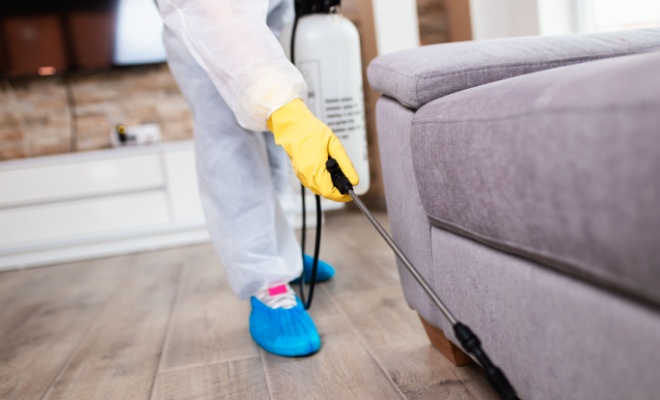
If traditional pesticide treatments do not work, then fumigation can be considered, but this should be reserved for only the most serious of infestations as the property has to be sealed off and vacated for a few days. It is also pretty expensive, yet is extremely effective!
A modern method of pest elimination called biological elimination can also be used in some cases. This involves reducing the number of pests without using poison traps or nasty chemicals.
Biological elimination means introducing predators into the environment that will hunt the pests in a natural way, bringing ecological balance to your property. This, however, won’t normally entirely remove a pest problem but will reduce it.
The easiest and most obvious way of removing pests is to take away their habitats or whatever else it is that attracts them to the area in the first place.
For example, leaving rotten food lying around in rubbish bags will, of course, attract rats, but if you stop doing this, they will have no food and will move on elsewhere! Keep rubbish in sealed or otherwise inaccessible containers to prevent attracting rodents as well as flies and other insects.
Prevention is always better (and cheaper) than cure, so avoid making your home attractive to pests!
DIY Pest Control
DIY pest control is a very clear option, especially when you have so many products available on the market. But, as we mentioned earlier, these products are often far inferior to that available to trained and licensed professionals.
Not only that, but correct risk assessments are also carried out by these professionals to ensure that the inhabitants of the home are kept safe during the treatment and are not being put in any unnecessary danger.
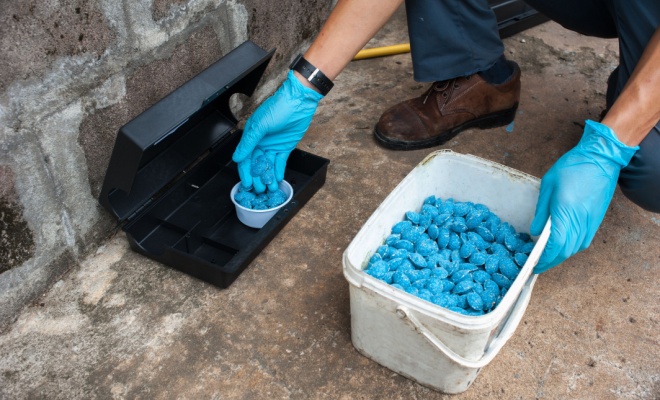
They may also need to seek permission from local bodies in the extent of the infestation and treatment requires more industrial action, such as fumigations or the removal of walls. We would always recommend consulting with a pest control company first, before making the decision on whether to attempt treatment on your own.
Types of Pest Control
As we mentioned earlier, there are a number of different pests that are known to infest homes, with having different signs and symptoms and requiring different measures to rid your home of them. Take a look at the list below:
Mice & Rats
The most common pest that infests homes in the UK is mice and rats. They are active all year round and prefer to take up residence in a warm home with plenty of food nearby. Despite their small size and objectively cute nature, these rodents actually bring several health concerns with them, making infestations a potentially dangerous affair.
Their bedding, urine and droppings carry diseases like Salmonella, Weil’s Disease and Listeria, and they are known to build their bedding close to food sources, increasing the risk of food poisoning to humans. Separate from the health concerns, mice and rats constantly gnaw away at anything they can find in order to maintain the length of their teeth. This increases the risk of floods, electrical trips, fires and damaged woodwork.
It’s also tough to keep mice and rats out of your home, considering they can squeeze through gaps as small as 5mm. They also take residence in small spaces that provide enough shelter, warmth and have close proximity to food sources, so wall and ceiling cavities are extremely popular locations.
It’s fairly easy to spot the tell-tale signs of a mouse or rat infestation. You’re likely to spot the following:
- Small black droppings around your home.
- A strong smell of ammonia due to their frequent urination.
- Grey smear marks on surfaces caused by the oils in mice fur.
- Evidence of nests in cavities, lofts, floorboards and cupboards.
- Damage and gnaw marks on cables, surfaces and food supplies.
Treatment for these infestations varies greatly. Of course, good prevention is the best way to avoid an infestation, so ensure all small gaps 5mm or larger are fully blocked up with wire wool or similar.
To get rid of mice or rats yourself without using a professional pest control company will involve the use of poisons and traps from hardware shops. You must ensure that you follow the instructions to the letter as these types of poisons can be very harmful to people and pets.
Bed Bugs
Bed bugs are tiny insects shaped like brown discs that are about 6mm in size and were once falsely attributed to unhygienic homes, but their prevalence in recent times have proved this to be not the case. Bed bugs can be brought into the home after travelling, through second-hand furniture and are mostly found in places that have many short-term occupants like hotels, hostels or villas.
They hide in crevices and cracks of beds and furniture and stay close to the host, which is humans. Disgustingly, bed bugs feed on human blood, which is why they like to stay close by and reside in places that we frequent. However, they can survive for up to a year without food, so starving them isn’t really an option.
The bite of a bed bug leaves a red, irritated mark on the body and victims of bed bugs will wake from a night of sleep with several on them. Bed bugs are really the result of bad luck, and it’s impossible to take measures to stop them from entering your home, but treatment for a bed bug infestation is available.
A DIY method is to heat your home to as warm as possible, which may kill bed bugs, but it’s unlikely that you’ll get them all, so it’s advised that people suffering from a bed bug infestation to contact and enlist the services of a professional.
Cockroaches
Cockroaches are probably the first things that come to your mind when you hear pest control, but they are fairly uncommon in the UK. Cockroaches struggle to survive outside and therefore look to take up residence inside where they can.
They feed on anything from litter to faeces, and while they can survive for months without food, they can only survive for a few days without water. Cockroaches prefer humid environments to stick close by to pipes, sinks and stoves.
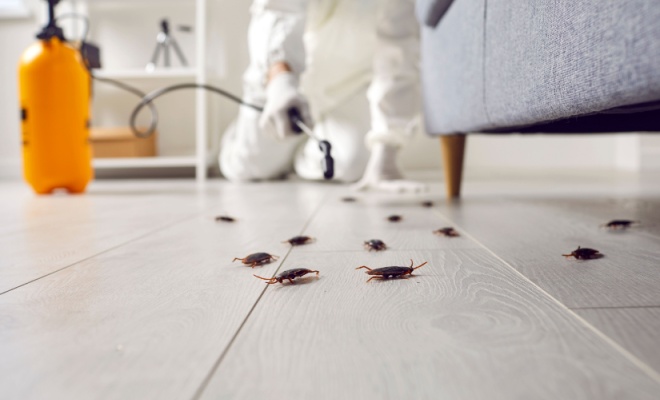
Cockroaches are carriers of several diseases which they can pass on through the food that they touch, and we then eat, causing food poisoning and other illnesses. Preventing cockroaches is pretty simple and mainly involves keeping places clean and tidy, cleaning regularly and by blocking any unnecessary openings around the home.
Cockroaches are notoriously tough to expel yourself, living up to their reputation, so if you’re suffering from a cockroach infestation, you’ll need to contact a trained professional. They will remove them with a series of techniques and the use of insecticides, which are proven to eliminate the roaches and their eggs to stop any further problems.
Fleas
Fleas, in the UK at least, won’t pass on any disease to humans or animals, but they will bite and irritate both to the point of madness. They live on warm-blooded and furred animals, most typically cats and dogs, and feed on their host.
They lay eggs all over the place with common places being soft furnishings like cushions or pet beds. The signs are clear if your pet is itching excessively, you or your pet have visible bite marks, or you can literally see them on your pet if you look hard enough.
You can treat your pets for fleas by purchasing any flea treatment from a pet store or from a vet's office. However, removing the fleas from your home is another matter altogether. A pest control professional will use specific insecticides to kill the flea population and its eggs from around your home, leaving all of its inhabitants comfortable and itch-free.
Wasps
These aggressive and feared individuals plague the country during the warm months with a ferocious mission to sting us all. However, this isn’t really the case, as wasps only attack when they feel threatened, but when you find yourself with a wasp infestation, it’s hard to keep them calm.
A wasp’s sting will at best give you a sore mark, but at worst send someone into anaphylactic shock as many people are allergic to wasp stings. Anaphylaxis is a serious thing that must be treated immediately as an emergency, so a wasp infestation can be very threatening indeed.
Wasp nests pop up all over the place and are built by thousands of wasps to provide a place for all of them to take shelter in. However, they sometimes erect one inside a roof or too close to your home, resulting in thousands of uninvited guests.
The earlier you locate the nest and enlist a professional to remove it, the less aggressive the squadron of stingers will be. A pest control company will decide on whether the nest needs removing, or whether it can be treated to send the wasps elsewhere without annoying or harming them. Either way, it’s not something that the layman should try to attempt.
Flies
These two-winged annoyances are often ignored and tolerated with a mere swipe in our homes, but we should be more concerned about them inhabiting our homes considering the health risks that accompany them.
E Coli and Salmonella are just two of the diseases that house flies can carry, and they are very active around the home, potentially causing a wide spread of infection.
There are obviously products like aerosol sprays to kill flies on-site, however, if the infestation is too prolonged, the eggs and larvae that may have been laid will far outweigh your ability to kill them on sight. Instead, a pest control professional will need to lay down insecticides to eliminate the fly problem from mature adults to premature eggs.
Ants
Ants hunt for sweet foods to bring back to the nest to feed the queen and the larvae inside the nest. Their social and hardworking nature makes them very adept at infiltrating homes to search for food, which creates a problem keeping them out.
The key to removing an ant infestation is to source the nests and destroy them; however, this rudimentary approach doesn’t always work, and in that case, a professional will need to assess the situation and suggest a different approach.
Pest Control Survey Cost
Local councils and pest control companies run pest control surveys for those people that think they may have an issue but are not quite sure on where or what is causing the problems.

Some companies provide these services free of charge with treatment, but if you chose not to have a treatment with the survey, you are likely to pay around £50 to £60. During the survey, a professional will look around your home for clues or tell-tale signs that you have a pest infestation and will advise you on what action to take.
FAQs
How to Find & Hire a Pest Control Contractor
The best place to start your search for a pest control contractor would be the local council listings, or with a simple search online. The key things to look for when searching for the best contractor is to ensure that they are accredited by the British Pest Control Association (BPCA).
This will ensure that they are trusted traders who have been certified to show that they are qualified to carry out pest control services on your home. You should also ask a contractor whether they are fully insured before enlisting them to carry out any work for you, to ensure you won’t be hit with problems down the line.
Sources
https://www.rhs.org.uk/prevention-protection/biological-control-garden
https://bpca.org.uk/write/MediaUploads/Documents/Research/Exec_summary_2013.pdf
https://bpca.org.uk/pest-advice/commercial
https://www.cleankill.co.uk/pest-control-inspection-services
https://www.smartservice.com/blog/pest-control-chemicals
https://www.domyown.com/pest-control-chemicals-a-318.html




